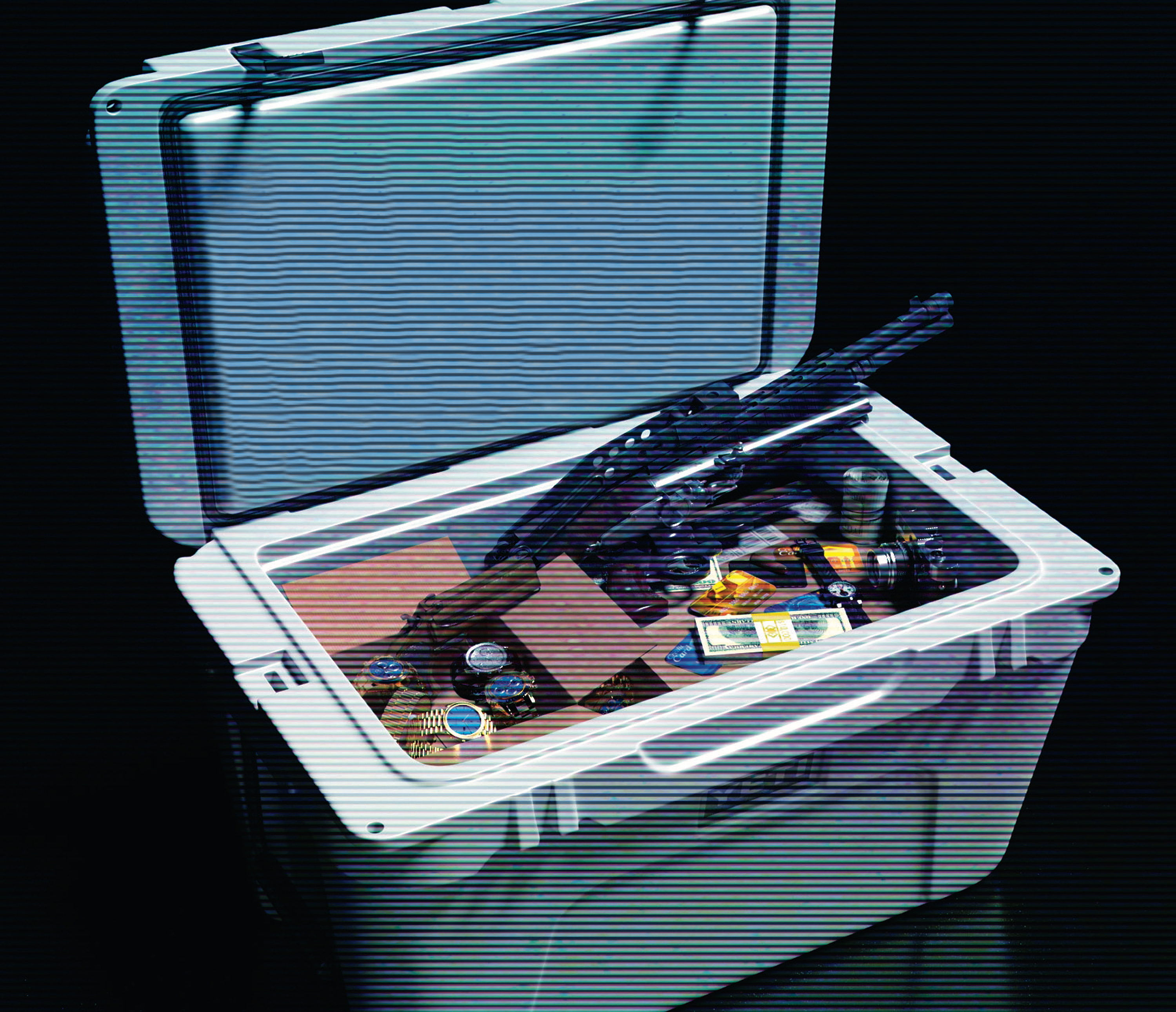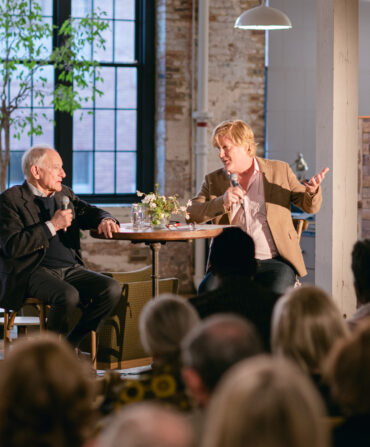Arts & Culture
An Alabama Kidnapping That’s Stranger Than Fiction
Rousted from his house by an audacious pair of criminals and their kids, a wealthy Birmingham businessman gets taken for the most terrifying—and bewildering—ride of his life

Illustration: Eddie Guy
FRIDAY, SEPTEMBER 11, 2020
A door slams.
A young man, M., has just entered a bedroom of a $2 million house atop Red Mountain, in Birmingham, Alabama. He stands over the bed where an older man, E., is asleep.
M. (loudly): Sir, hello. Why are you in my house, sir?
E. (still half asleep): Nahnah… What?
M.: What are you doing here?
E.: You scared me.
M.: What are you doing here, sir? What are you doing here?
E.: Excuse me, what do you mean?
M.: Are you supposed to be here?
E: Yes, I live here. I rent this house.
M.: No sir, I just bought this house off the market. I bought this house and everything in it two months ago.
E.: Uhh… no you didn’t.
M.: Yes sir, I did. I have my whole family here today. I have my whole family here right now. Who are you?
E.: I am Elton Stephens, and I am renting this house.
Elton B. Stephens Jr., to be exact. Seventy-five years old; six feet tall, 180 pounds; gray hair, blue eyes. He is fourteen years retired as manager of the real estate division of EBSCO Industries, Inc., a privately held international conglomerate started by his father. The company’s private holders are Elton’s family, one of the wealthiest in the South. Elton has been separated from his second wife for a year. And for that year he has, it is true, rented the house in dispute from a friend of his (referred to hereafter as Mr. B.), while his new house is being finished.
By way of full disclosure, I should mention that I have known Elton and his family almost all my life. His siblings—two sisters and an older brother—are private, discreet, Apollonian people, while Elton has always had a Dionysian lean toward partying, fast cars, good food, good wines, and pretty ladies. He has an endearing grin, a Deep South drawl, not a shred of pretense or affectation, and a sweet soul. He also has sleep apnea. Every night when he goes to bed, he pulls up an app on his phone called SnoreLab that records his snoring and breathing overnight, along with any other sounds made nearby—such as those of the Kafkaesque nightmare he finds himself waking to this morning, a nightmare for which nothing in his blithe seventy-five years has prepared him.
(Note: Despite the fact that it seems like someone had to have made it up, the dialogue in this article, up to when Elton leaves the house, is taken directly from the SnoreLab recording, though some of it has been edited for clarity and/or reordered.)
E.: So, what now?
M.: You tell me.
E.: You want me to leave?
M.: I need to see some credentials, ’cause I got mine. I think you are lying to me. Who do you rent it from?
E.: Mr. B. (another Alabama Croesus, whose name is well known in the state).
M.: Well, I brought my family here to show them their new home.
E.: Okay. Can we go in the living room?
M.: No, my family is in there.
E.: Buddy, you are scaring me.
M.: I’m not trying to scare you, bud. If I was trying to scare you, I would scare you. I mean, this is just crazy as f**k. I’ve never done any business with Mr. B. I mean, I’ve bought high-end cars from him [not true], but never any real estate business. I didn’t take him as a crook.
E.: So, do you want me to leave? I would like to get in my car and leave, please.
M.: No. We gotta figure out why the hell I’m out a whole house here.
E.: Is this a robbery?
M.: Absolutely not, sir. A robbery? Do I look like a robber?
E.: Yes.
M.: I do?
E.: No! You don’t look like a robber. I didn’t mean that… Can we go in the living room, please?
M.: Are you going to be copacetic in front of my family? We’re going to act real correct in front of my fiancée and her kids, right? If you make them feel out of place or something like that, I will hurt you.
E.: Do what?
M.: ’Cause I have no problem with you meeting my family as long as you act correct. But there is a reason I am here.
E.: Okay. What is it? Money?
At this point, M. picks up Elton’s phone from the bedside table and puts it in his pocket, where it continues to record for another two hours, the words a bit muffled, but audible. Elton gets out of bed in his pajamas, and they go into the living room.
M.: Baby, baby, baby, baby! This is Mr. Elton. Say hey to Mr. Elton.
T.: Hey. How are you?

Illustration: Eddie Guy
T. is Tabatha Nicole Hodges. Thirty-one; five foot five, 130 pounds; brown hair; a severe mouth, lynx eyes, a number of traffic violations and an arrest for unlawful manufacture of a controlled substance going back ten years. With her on a sofa in the living room are two children: a boy, thirteen, and a girl, eleven. They all stand and nod at Elton, who says to M., “You have a nice family.”
M. is Matthew Amos Burke. Thirty-four; five foot seven, 170 pounds; brown hair, blue eyes. He has a wrestler’s neck, beefy tattooed arms, and a put-upon set to his features. He is wearing a turned-around baseball cap, a black shirt with a red horse on it, a white belt on blue jeans worn below the hips, and red tennis shoes. In the past decade, he has been arrested multiple times on charges including unlawful possession of all kinds of drugs, tampering with evidence, resisting arrest, carrying a pistol without a permit, and trafficking methamphetamines—for the last of which he has just completed a three-year jail sentence and is currently out on probation.
Matthew and Tabatha arrived at Mr. B.’s house more than five hours ago, around 2:00 a.m. They forced open a door to let themselves in and liked what they saw. Parked outside in the driveway were Elton’s 2012 Toyota Tacoma pickup and two of the seventeen luxury cars he collects: a 1971 Mercedes 280 SL and a 2012 Maserati sedan. So pleased were Matthew and Tabatha with Mr. B.’s home that they took the keys to the Maserati from a kitchen table, drove the forty-five minutes back to their trailer in Remlap, Alabama, woke up the two kids to show them their new car, and brought them back to the house in Elton’s Maserati.
Listen to part of the dialogue between Matthew Burke and Elton Stephens, as recorded on Stephens’s snoring app:
After their return to Mr. B.’s house at 7:00 a.m., the family raided the fridge, tried out all the furniture, and admired the floor-to-ceiling windows, the artwork, the classic Triumph motorcycle on show in the living room. They also helped themselves to a number of items belonging to Elton: a camera, some credit and debit cards from his wallet, an Italian shotgun they found in his closet, a derringer and a 1945 long-barrel Smith & Wesson revolver from his bedside table, ten or twelve high-end watches from another of Elton’s collections, and a Yeti cooler to carry all the loot.
You might well be wondering at this point: What did these people think they were doing? And the only possible answer is: Who knows? Whatever it was, it might have been influenced by one of several illegal substances in which they were known to indulge. Elton believes that someone must have told Matthew about that splendid house and the elderly renter living in it. That the couple actually thought they could talk their way into taking up residence there seems at the same time wildly improbable and to be the case. Also the case is that they did not know who the elderly renter was, or how deep his pockets were. But they would soon find out.
In the living room, Elton and Matthew continue to debate whose house it is. Matthew asks how much Elton thinks the house is worth. Elton tells him two or three million, and Matthew says yeah, well, he paid two-point-something, he can’t remember exactly, for the house and everything in it, and he doesn’t like getting ripped off. Elton asks if Matthew wants some money: “Like I could write you a check.” Sounding insulted, Matthew says he doesn’t want money; what he wants is his house.
“This is not a common mix-up, sir,” he says.
“Huh?”
“This is not your everyday common mix-up, like you got the wrong luggage or something.”
“Look, you can take anything you want,” Elton says.
“I don’t want to take nothing. It’s all mine anyway. I already paid for it.”
“You want a car?”
“I don’t want a car! I want what I paid for… I just don’t know why this is happening to me. I mean, I would do anything for these kids out there, man, and this little lady here. She’s had a rough life, man, and I promised them better.”
“Well, I can help you out.”
“Well, start talking.”
“Well, you say you don’t want any money…”
“You don’t know what I want, buddy.”
And it becomes increasingly clear as the conversation continues that neither does Matthew—not exactly, anyway. Elton repeatedly asks to be allowed to put on his clothes and go to the bathroom, and is eventually permitted to do so.
“You wouldn’t dare get a gun, would you?” Matthew says. “Don’t do that. That wouldn’t be safe.”
“No, I would never do that.”
“Okay. I’m just sayin’.”
But what Elton does get from the bathroom is Xanax, and he swallows two of them before he comes out. They come in very handy over the next seven hours.
Back in the living room, Matthew asks if Elton owns any properties. Yes, he is told—a new house in Birmingham into which he is moving in a month, and a five-hundred-acre farm in Bibb County. Matthew and Tabatha show interest in the farm. They question Elton about what it is like and discuss the possibility of Elton’s just giving them that in place of Mr. B.’s house. But Elton explains to them that deed transfers, etc., will require more time and people involved than they probably… would like.
“Whoo, okay,” Matthew says. “So how much money can you transfer to my account? Liquid.”
“I don’t know how much you want,” Elton says. Then, disingenuously, “I don’t have a lot of money. What would make you leave me alone?”
“Forever?” Matthew asks. “Or just for today?”
There is no need to report Elton’s reply to that. Meanwhile, the kids are starting to become uncomfortable, as in maybe this is not their house.
“Are they hungry?” Matthew asks Tabatha.
“Yeah.”
“Do you have anything to eat in the kitchen?” he asks Elton.
“Tommy [not his name] isn’t going to eat,” Tabatha says.
“Why?”
“Because he says he felt funny when he found out this guy lives here. He said, ‘Well, I feel funny walking around if it’s not our house.’ And I said, ‘No, it is our house.’ But he still won’t eat.”
Elton says, “I have some chicken salad. You folks want some chicken salad?”
“Hell yeah, I want some chicken salad,” Matthew says, and he and Elton go into the kitchen. Digging into the chicken salad, Matthew says, “You got any crackers? Where are your crackers at?” After rummaging around in the cabinets and finding only some disappointing Wheat Thins, he says to Elton, “Have a seat. I don’t want you standing up, ’cause you look nervous… You need to make my kids feel comfortable.”
“I didn’t make them feel uncomfortable.”
“They won’t even come in here and eat. They said they felt uncomfortable… Where’re you going, bub?”
“Just going to sit in the living room,” Elton says.
“Don’t make me… See, you’re getting a little wild right here,” Matthew says, following Elton into the living room. “Whaddya doing, baby?” he asks the little girl. “You hungry? There’s some chicken salad in there on the table and some ughh crackers.”
The girl: “Mama said that you were gonna try to get that farmhouse he has.”
“Yeah, I think we are,” Matthew tells her.
Taking another tack, Elton suggests that they all drive down to his bank, where he will write Matthew a check for $10,000, and then Matthew and his family can go about their business.
“Ten thousand dollars?” Matthew says. “You wouldn’t live ten more minutes for $10,000! And don’t look at me like that. It’s insulting.”
“Well, I’m not trying to insult you.”
“Well, you just did, and very blatantly too, sir.”
Now Tabatha comes up and whispers something to Matthew, who turns to Elton and says, “Sir, you might just have to take a road trip right here.”
Elton: “Do what?”
“You might have to take a road trip right here. I mean, you said when I asked you how much time you have left, you said maybe ten years or so on your life, right? Well, I think you have twenty. And it’s all depending on this day here. It’s that easy. It’s very easy.”
“What is that?” Elton says.
“Living. The hard part is dying.”
That is indeed the hard part, and Elton wants none of it. Throughout the three and a half hours in Mr. B.’s house, almost two and a half of which were recorded by SnoreLab, he has maintained, presumably with help from the Xanax, an almost preternatural sangfroid in a situation made even more terrifying by being so comically surreal. When they leave the house for he-doesn’t-have-a-clue-where—he and Matthew in Matthew’s black Chevrolet Tahoe, Tabatha and the kids following them in Elton’s pickup—he is understandably sick with fear and determined to try to make no mistakes in attempting to stay on the good side of his, as of now, kidnappers. And but for one large mistake, he succeeds.
Matthew pulls off Highway 280 (the section of which is named for Elton’s father) onto University Boulevard, where he is forced to slow in front of a McDonald’s.
And Elton tries to jump out of the Tahoe!
But Matthew reaches over one big arm and grabs him by the shirt, tearing off some buttons. Pulling Elton’s face into his, a Matthew horrifyingly different than Elton has seen before says, “You do that again, I will kill you and your family.”
“I’m sorry,” Elton says. “I’m really sorry. But man, you’d do the same thing, wouldn’t you?”
Petrified as he is then, Elton becomes even more so when Matthew pulls into a service station and gets out for a quick conversation with some sketchy-looking buddies of his, thinking Matthew might be giving him off to them for… whatever. In such a situation, any small relief feels massive, and so it is for Elton when Matthew gets back into the Tahoe. So relieved is he, in fact, that when they pull off next at Full Moon Bar-B-Que for an early lunch from the drive-through, Elton grabs the tab.
Repeatedly, before lunch and after, when Matthew drives north out of Birmingham on Interstate 65, Elton asks where they are going, and is repeatedly told it doesn’t matter; but finally, “To my place.” On the drive there from the city, Matthew tells Elton about the three-year jail sentence he has recently finished serving. He says that, in fact, he is just a messenger, that he has a “boss” who is into heroin distribution and sex trafficking. Then he adds, unnervingly, something about duct tape and that if Elton mentions to anyone what is transpiring today, he doesn’t want to know what that boss will do to him and his family.
When he exits the interstate, Matthew drives out into the countryside of Blount County. Elton tries to keep track of where they are, but there are too many turns onto back roads with no signs. “You might as well forget looking around, bub,” Matthew tells him. “No chance in hell you’d find your way back here.” Elton notices a church called Grace Community, and when Matthew finally turns into a field with a couple of trailers, he has the presence of mind, despite his fear and the Xanax, to note a white mailbox up the road a piece with the number 3745 on it.
Matthew drives through the field and stops at the second trailer back. He turns off the engine and sits for a moment without speaking. Behind them, Elton can hear Tabatha and the kids getting out of his Toyota. Please God, please God, please God, he prays silently. And he repeats that prayer every hour for the rest of the day.
“Home sweet home,” Matthew finally says.
![]()
The trailer is in Remlap, population 2,464, its name the backward spelling of Palmer, a family who lives there. Elton has never been to Remlap before. Nor does he ever wish to return.
Inside the trailer, Tabatha and Matthew lead him into their bedroom, where an air conditioner is cranked up as far as it will go, and bras hang from the light fixtures. The three of them sit on the unmade, sheetless bed. Matthew lights up a joint, then gets down to business.
“So, tell me the truth now, bub. How much money can you get your hands on, say wire into our account today?”
And Elton does tell him the truth. “Five hundred thousand dollars,” he says.
Matthew and Tabatha stare at him for a moment, then Matthew says, “Okay… We want half of it.”
“Fine,” Elton says. “But I’m cold in here. Can we go somewhere else to talk about it?”
“You bet,” Matthew says, and leads Elton through the trailer, where the kids are playing a video game, to a small deck facing the rear of the field—without another human being in sight. The only seating on the deck is an old wheelchair, to which Matthew motions Elton, then takes his seat on a truck tire.
Matthew offers Elton a joint, which Elton declines, and they discuss the best way for Elton’s money to become Matthew’s. After a few minutes, Tabatha joins them, and she has showered and dressed for the occasion: wet hair slicked back, wearing white jeans and a blue halter top. She sits on a stool she has brought from the kitchen and says, “So, where’re we at?”
Matthew tells her that Elton will call his banker and explain that he is buying a farm property from Tabatha, and needs the banker to transfer the purchase price of $250,000 into her account ASAP. Tabatha asks how long that will take and Elton says he doesn’t know, but probably not very long.
“Let’s do it!” she says.
Matthew still has Elton’s phone, and Tabatha tells Elton to use hers to call the banker. She gives him her account and routing numbers, and Elton makes the call on speakerphone as directed. The banker tells him he will send the request to the wiring department and that someone will call Elton back in an hour or so, maybe more, once the transfer is completed. He asks what number he should call. Elton looks at Tabatha, who motions to her phone. “On this number I’m calling you from,” he tells the banker.
Here they are now, the three of them, with a deal more or less straight between them for the first time all day. Except for one important detail: “You’re going to take me home as soon as the money is in the account, right?” Elton asks, and Matthew says yes, they will take him home then. “Shake on it?” Elton says. And they do.
Would you believe Matthew? Doesn’t the situation shout that no, they will not take you home—after you have used Tabatha’s phone to call the banker and given him Tabatha’s account information—but, far more practically, dispose of you in some gruesome way? And wouldn’t you wonder if there was anything you could do, here and now, to make that gruesome disposal less likely? I do not believe, nor does Elton, that he was thinking that strategically as they sat on the porch after the call. But I do believe that his body or one of those buried faculties like an id was thinking for him.
The world as experienced by a particular animal, its distinctive perceived universe, is called by ethologists that animal’s umwelt. It is hard to imagine two men with less similar umwelts than Matthew Amos Burke and Elton B. Stephens Jr. But I believe that while on the trailer deck, Elton sensed on some pressing, primordial level that the more he could bond his umwelt to Matthew’s, the better his chances of survival.
So, over the next two hours, Elton brilliantly directs the conversation into the lingua franca of the Deep South: cars, hunting, and fishing. The three of them sit there talking those subjects from a stool, a wheelchair, and a truck tire as comfortably as three hog farmers at the end of a long workday. Occasionally, the undeniable horror of his situation surfaces in Elton, and once, it takes voice:
“You are not going to sex-traffic me, are you?”
“No. You’re too old and ugly,” Matthew reassures him.
“Aww, baby,” Tabatha says, “he’s not that bad.”
But otherwise, Elton keeps to his inner script, and to very good effect. “What are y’all going to do with the money?” he asks Tabatha about an hour after the call to the banker. She jumps off the stool, takes back her phone from Elton, and starts thumbing through her photographs.
“Here,” she says. “This is our dream house. Now we can buy it for us and the kids.”
The photo shows a white two-story, five-bedroom house near Remlap with plenty of land for horses and cows for the kids to enjoy. His old career in real estate kicking in, Elton asks what the owners are asking for it. As it happens, the figure is around $250,000. And now, says Tabatha, they have it!

Eddie Guy
No, no, no, Elton tells her: They don’t want to pay the full price, or in cash. What they want to do is start with an offer of about $190,000, then put down 20 percent of whatever figure they get the house for in cash and mortgage the rest. Taking back Tabatha’s phone, he does the mortgage calculation for them, coming up with payments of about $700 a month. This nearly tickles the couple to death.
“It’s where we are going to be married,” Matthew says. “And you know what? We want you to come to the wedding.”
“Yeah,” Tabatha says. “We want you to be a pallbearer.”
When word finally arrives on Tabatha’s speakerphone that the $250,000 has been transferred to her bank account, she and Matthew, according to Elton, are as happy as kids on Christmas morning.
“Now you’re going to take me home and not hurt me, right?” he says to Matthew, and Matthew says yes, as soon as they make one stop. Again, they shake on it.
The stop is at HomeTown Bank in Pinson, to which Matthew drives the Tacoma with Elton riding shotgun and Tabatha in the back. Tabatha walks to the ATM and comes back waving a deposit receipt for $250,000. Jumping into the back of the Tacoma, she hugs Matthew’s neck. “We got our house, baby!”
“Now you’re taking me home, right?” Elton says again.
“Right, right,” Matthew says and fires up the Toyota.
On the drive back into Birmingham, Elton is more frightened than at any other time during the day. Matthew and Tabatha have the money; how can it possibly benefit them to set free the only person who knows how they got it? It’s not until they turn onto the expressway with his father’s name on it, headed back toward Mr. B.’s house, that he begins to believe that, unlikely as it seems, they might be doing exactly that. It helps that Matthew mentions, without much heat, that of course he will have to kill Elton and his family if Elton tells the police what happened to him.
They arrive at Mr. B.’s house at around 3:45.
Elton gets out of the pickup, as does Matthew.
“We’re gonna borrow your truck for a couple of weeks,” Matthew says.
“Just keep it,” Elton says and starts to walk up the steps to the front door.
“Come here,” Matthew says.
Come here? But Elton walks back to the pickup. Matthew hands Elton his phone. Then he gives him a hug. And drives away.
Fairly boiling with adrenaline and relief, Elton lets himself into the house. He sits down on a sofa and takes a few deep breaths. Then he pulls out his phone and stares at it.
If I were writing a fictional screenplay of this story, I would be sorely tempted to end it with a cut away from Elton staring at his phone to this:
Lawn outside a white two-story house near Remlap, Alabama. Day.
A wedding reception is going on. White tents, caterers, a band playing. A festive wedding party of about a hundred people.
ANGLE: The man who is paying for the reception, Elton B. Stephens Jr., rises from his seat at a linen-draped table with Champagne bottles on it, to toast…
ANGLE: the smiling newlyweds across the table from him.
But this is not a movie, and that is not at all what happens. As he stares at his phone, Elton is indeed wondering whether he should call someone—not out of any well-wishing impulses toward his abductors, but because he fears that if he does, his recently bonded kidnapper pal might come back and kill him. Finally, he calls his older brother. No answer. And no answer from either of his sisters. He gets into his Maserati and drives to his brother’s house; no one is home. Then he drives to the big house on a hill that used to be his, and now is the home of the wife from whom he is separated and their son.
She is at home, and Elton tells her what has happened to him. From her house he also reaches his brother and one of his sisters, telling them both that he is not at all sure about bringing the police into this; in fact, the more he thinks about it, the more he leans against it. But by now it is too big a ball to keep from rolling. Immediately after getting off the phone with Elton, his sister calls Ashley Curry, a retired FBI agent who had also worked for the family business. Curry tells her that of course the police and the FBI must be notified and that he will do it.
But, says the sister, they told Elton they would kill him if you do that.
“Oh, they all say that,” Curry says.
Shortly after 6:00 p.m., to Elton’s surprise and consternation, the driveway outside his estranged wife’s house fills with cars from the Mountain Brook and Birmingham police forces and the FBI.

Eddie Guy
SATURDAY, SEPTEMBER 12, 2020
By midafternoon the following day, Matthew and Tabatha were under arrest. Using GPS tracking on Elton’s phone, the Birmingham police had little trouble locating the trailer in Remlap, and when they showed up there shortly after noon, Matthew and Tabatha were, perhaps unwisely, at home. When she saw the cruisers pull into the field, Tabatha grabbed up all of Elton’s watches, guns, credit cards, and the like and started frantically hiding them. But by the time the police entered the trailer, she realized she hadn’t needed to do that, since the story she was busy inventing for herself would provide a reason for the stolen goods’ presence.
While Matthew was handcuffed and driven back to police headquarters in Birmingham, two detectives stayed at the trailer with Tabatha. One of them, Detective Tamira Butler, told Tabatha she was sending for a warrant to search the trailer. No need to do that, said Tabatha. I want you to search it so I can show you all the stuff I took from Mr. Stephens. Detective Butler then announced that she would take Tabatha’s statement while she and her partner searched the trailer with Tabatha’s consent. Tabatha was only too eager to provide that statement—which can only be admired for its sheer virtuosity of imagination under pressure, as well as its motive for keeping her fiancé out of jail.
The very short version of Tabatha’s long taped statement: She worked a part-time job as a maid (she didn’t) and had been sent on three separate occasions to clean Mr. Stephens’s rented house (she hadn’t). On the second of those occasions, Mr. Stephens had gotten touchy and intimate with her, and during the third, he had forced her into oral sex at gunpoint and then raped her. He hurt me, she told Detective Butler, and I wanted to hurt him back. So yesterday she drove up to the house Mr. Stephens was renting to do just that. But Matthew, who wanted no part of her revenge, had followed her and, in a three-way confrontation with Mr. Stephens, urged her to “let it alone, baby”; they would just take their story to the police.
Panicked by that prospect, her story continued, Mr. Stephens had then given them the guns, watches, camera, credit and debit cards, Yeti cooler, and yes, the more or less $5,000 in cash that Detective Butler had just found in the trailer (which Tabatha had actually withdrawn the day before). He had given them all of that, plus his truck, plus the $250,000 he had wired into her account, to keep them from turning him over to the police. So, she said, Matthew “didn’t have nothing to do with it.”
One can almost see in the pages of the transcribed tape Detective Butler struggling not to laugh out loud as she asks Tabatha: So, you didn’t kidnap him? No, of course not! And he gave you all this stuff? Yes, yes. And your kids were not at his house with you? No, they were here at the trailer with (Tabatha’s friend) Taylor. But Taylor says they were not here, they were with you. Well, Taylor is lying… And so on.
In the meantime, at Birmingham police headquarters, Matthew was giving his statement to Cameron Beedle, at the time a Homewood police detective on assignment to the Secret Service as a Task Force Officer, and it was very different from Tabatha’s. In the transcribed tape of that statement, Matthew insists that he and Tabatha just took an early morning cruise up to Mr. B.’s house to pay a visit to an old friend of Tabatha’s, Mr. Stephens, who might have… well, might have been her sugar daddy at one time. During their nice friendly visit, Matthew happened to mention a house they had wanted to buy but their loan application had been turned down. And Mr. Stephens said, You know what? I’m just gonna give that house to y’all for y’all’s wedding present, and I’ll just transfer the money for it into y’all’s account.
Then Detective Beedle read Matthew the multiple charges against him, and prepared to drop the hammer.
So, you’re saying there was no forced entry, no kidnapping, no theft of property, and no extortion—correct? Correct, Matthew says: none of that. Mr. Stephens was just a real friendly old guy who maybe felt bad about maybe once being Tabatha’s sugar daddy and now he wanted to help them out.
“Okay,” Detective Beedle says. “Nothing else you want to tell me?”
“No. Everything was authorized by this dude: gifts for the wedding soon to be, and uh, a home for our family.”
“Okay,” Detective Beedle says. He has something he wants Matthew to listen to. “You ready?”
“Yeah.”
And Detective Beedle plays for Matthew the SnoreLab recording.
EPILOGUE
And that was that, right? Well, it should have been. But it wasn’t.
Neither of their statements having hauled much water with the police, Tabatha and Matthew were taken into custody that Saturday afternoon and locked up in the Jefferson County jail in Birmingham, with various charges brought against them by the state of Alabama. Since those charges included kidnapping, the FBI was also involved with the case, and a little over a month after their arrests, Matthew and Tabatha were indicted by the Feds.
From here on, Tabatha’s route into federal prison was fairly straightforward. But Matthew’s, not so much. After his indictment, he was transferred from the Jefferson County facility to a jail in Hoover, Alabama, where federal prisoners are warehoused until their trials. At Matthew’s federal court trial in November 2021, he and his court-appointed lawyer agreed to a binding plea bargain, whereby Matthew would accept serving a seventeen-year sentence in the federal prison system in exchange for the dismissal of all state charges against him.
After his sentencing, Matthew was transferred back to the Jefferson County lockup with a federal detainer notice saying, in effect, to the state: Hold this guy until we, the Feds, can lock him up. But somehow that detainer notice got lost in the system. And so on Friday, December 10, 2021—almost a year and three months from the day of his arrest—a Jefferson County sheriff’s deputy happened to notice that there were no state charges against this Matthew Amos Burke guy who was somehow in their jail… and set him free!
At large again, Matthew dyed his hair a bizarre shade of blond and quickly learned that very few of his friends and relatives had much inclination to harbor him. So he bounced around from motel to motel in various suburbs of Birmingham, somehow believing, it would seem, that his best chance for evading the various police forces, the FBI, and the Gulf Coast Regional Fugitive Task Force, all of them looking for him, was to stick around the city where he’d committed his crime.
Needless to say, Elton hoped Matthew had fled to Namibia, but he arranged for round-the-clock security for himself and his wife and son in case he had not.
In the end, none of the abovementioned arms of the law finally located Matthew, but rather a six-foot, 275-pound, bald and bearded born-again private investigator named Odie Oden, who had taken an interest in the case from the beginning. No one had hired Oden to find the fugitive, but he’d decided to do so anyway.
One afternoon, seven days after Matthew’s release, Oden got a call from one of his many sources around town, who gave him a phone number. He traced the number to a Chevron station in Alabaster, about thirty minutes south of Birmingham. So he took a drive out there and sat in his car, surveilling the station. After a while, he saw Matthew walk out from behind a dumpster where he was apparently living and go into the station, whose phone he had been using to try to find anyone who might help him out. Oden called the Alabaster police, and within minutes twelve officers showed up with shotguns, trapping Matthew inside the Chevron.
He was said to have given up calmly.
And, I’m betting, with a measure of relief.
Matthew Amos Burke is currently serving seventeen years at a federal correctional institute in Manchester, Kentucky, on charges of kidnapping, bank fraud, and attempt and conspiracy to commit the offense of bank fraud.
On the same charges, Tabatha Nicole Hodges is serving twelve years at a women’s federal correctional institute in Aliceville, Alabama. In her original plea, she stated that the kidnapping was all her idea and that Matthew had nothing to do with it. Later, she recanted that plea.
Elton Stephens’s attorney throughout all the above is a smilingly sardonic, seen-it-all, seventy-one-year-old criminal defense lawyer named Tommy Spina, who has defended every imaginable type of criminal for forty-five years all over the country. In one of my many conversations with him while reporting this story, Spina summed it up as well as anyone: “You’ve heard of blue-collar crime and white-collar crime. Well, this was no-collar crime.”







